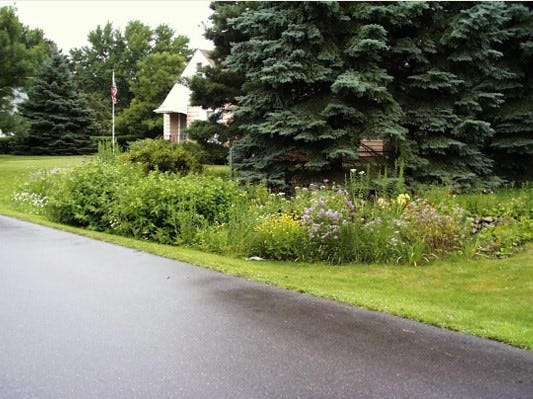Benefits of Creating a Rain Garden
Reduce Your Storm Water Runoff and Protect the Environment
Rain gardens are becoming increasingly popular for landscaping, with good reason. Not only do rain gardens add beauty and biodiversity to a landscape, but they also offer several environmental benefits.
One major advantage of rain gardens is their water retention capabilities. Rainwater is naturally stored in the garden bed, allowing it to soak into the ground more slowly than on a traditional lawn or driveway. This helps reduce stormwater runoff that can cause flooding and water pollution in nearby bodies of water, such as lakes and rivers. This water absorption also helps maintain groundwater levels during dry periods.
Additionally, rain gardens improve water quality by helping filter pollutants out of stormwater before it reaches other water sources. The soil and plants act as natural filters, trapping sediments and other pollutants from water that flows through the garden. This water can then be used for irrigation, allowing for further water conservation services.
Rain gardens also help create habitats for a variety of wildlife species. The addition of water and plants in an area can attract frogs, birds, insects, and other animals that add diversity to a landscape. These creatures can also assist with pest control by preying on harmful bugs such as mosquitoes.
Overall, rain gardens are an excellent choice for homeowners looking to improve their landscape while helping the environment at the same time. With water retention capabilities, water filtration benefits, attractive design possibilities, and wildlife habitat creation, rain gardens provide a number of great advantages over traditional landscaping options.
So if you’re considering investing in a water-friendly garden, consider the benefits of installing a rain garden for your next landscaping project. You’ll be doing your part to help conserve water and reduce water pollution—while enjoying the beauty of nature right outside your door!
For additional information and resources on rain gardens and other residential stormwater management features, visit https://www.novaregion.org/1403/Residential-Stormwater-Best-Practices.
The Northern Virginia Regional Commission operates the Clean Water Partners Campaign to help our local government partners and other to help educate the public and key stakeholders on the importance of reducing stormwater runoff and pollution. Visit their website for common sense recommendations on how you can reduce your stormwater runoff and protect our streams, rivers, the Chesapeake Bay and our drinking water supply.
You can also visit our YouTube channel to view our video on how to create a rain garden.
About the Northern Virginia Regional Commission
NVRC is a consortium of thirteen local governments representing more than 2.5 million residents. The region has a GDP of $251 Billion which is 41.4% of the GDP of the Commonwealth of Virginia. Northern Virginia’s GDP is larger than 26 states and if a country would be the 46th largest economy in the world.


